M&A Report

At a Glance
- Retail was one of the most heavily impacted sectors in 2020; Covid-19 accelerated the shift to online retail (and the accompanying need to further digitize and consolidate the industry) by multiple years.
- The retail M&A practitioners we surveyed expect M&A to contribute almost 60% to top-line growth over the next three years vs. around 35% over the past three years.
- Scale, both regional and absolute, will be critical. But it will not be enough. Retailers will need to develop faster innovation muscles, leveraging data and analytics while participating in broader ecosystems.
- M&A and divestitures will play a critical role in achieving scale (or exiting subscale markets) but also in getting access to digital, data and analytics, and delivery capabilities through scope deals.
Covid-19 raises the stakes for retail deals
The Covid-19 pandemic hastened the shift to e-commerce, increasing the importance of M&A in the retail industry. The retail M&A practitioners we surveyed expect M&A to contribute almost 60% to top-line growth over the next three years vs. around 35% over the past three years, representing one of the highest jumps among all industries surveyed. Activity will intensify for both scale and scope deals. Markets are looking for scale, growth, and digital performance—no player can do all of that without M&A.
Nowhere is this seen more clearly than in the grocery sector. Some of the activity takes the form of traditional consolidation in which retail chains buy other chains and sites. But increasingly, grocers are taking other approaches. For example, some are buying or partnering to integrate supply chains. Others are partnering to access new capabilities and technology and to accelerate growth of new channels. That was the aim of Kroger’s partnership with Ocado, for example. And Ahold Delhaize’s deal for online grocer FreshDirect was intended to shore up newly critical digital and e-commerce capabilities.
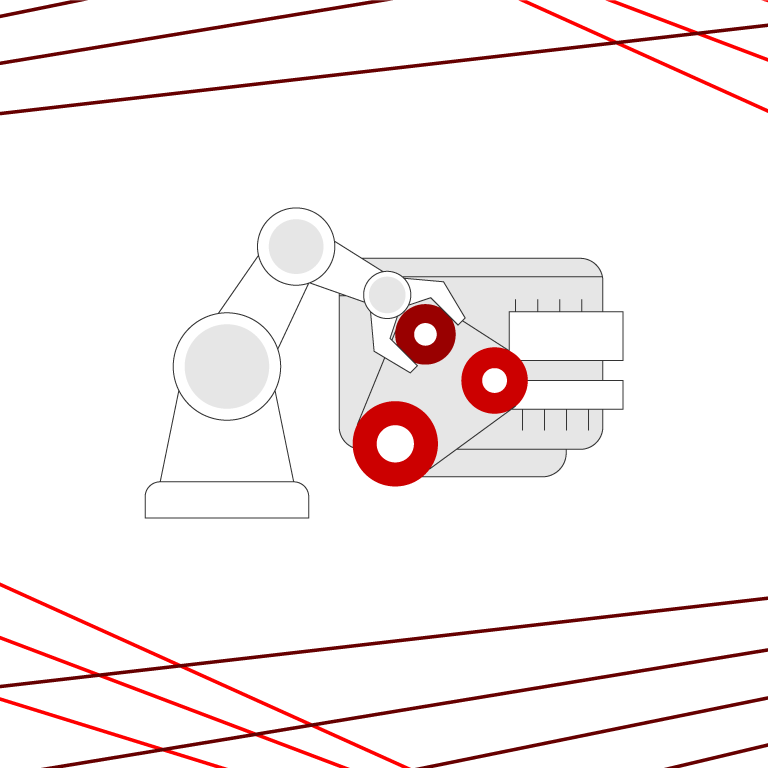
How Covid-19 Has Reshaped Retail M&A
In an industry that has undergone multiple years of digitization at warp speed, it will take more than scale to succeed.
The need to build scale
Scale M&A, both regional and absolute, is becoming one of the key enablers for securing a future in a retail world that is increasingly digital. Local scale drives profitability and enables investments in must-have home delivery capabilities now. Absolute scale enables companies to make the required massive investments in emerging e-commerce growth platforms and to unlock new transferable insights from data across markets. Covid-19 accelerated e-commerce, and e-commerce is a scale game. It also focused attention on the importance of labor stability, highlighting the need for faster automation, which also is the domain of scale players.
Grocery margins are often under intense pressure, and scale M&A is one of the few levers available for saving 1% to 2% of sales to provide cash to fuel growth (see Figure 1). Companies that are able to implement and repeat successful scale deals create significant competitive advantages and are rewarded accordingly. From 2007 to 2017, such companies have grown profits by 6.6% per year vs. 2.2% for other retailers.
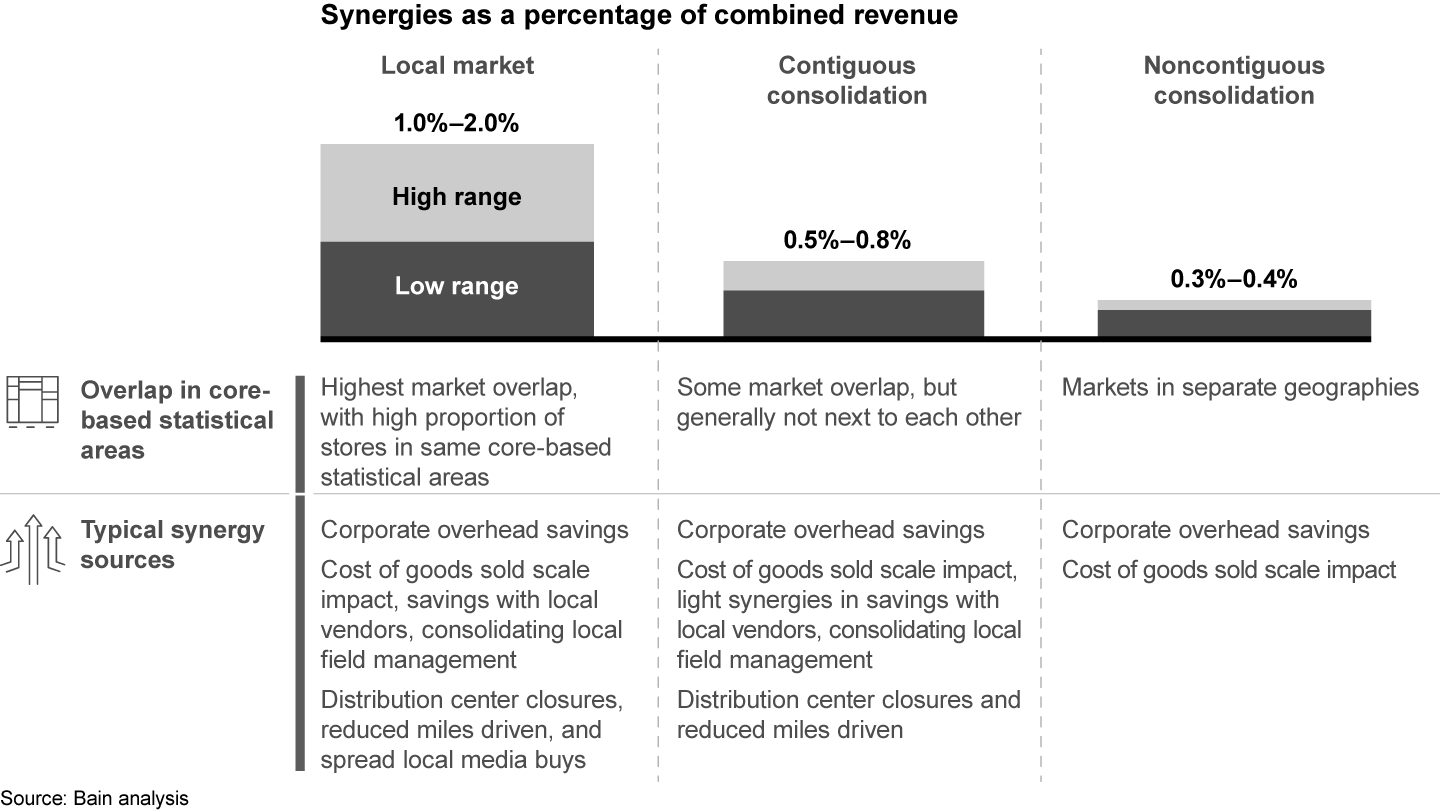
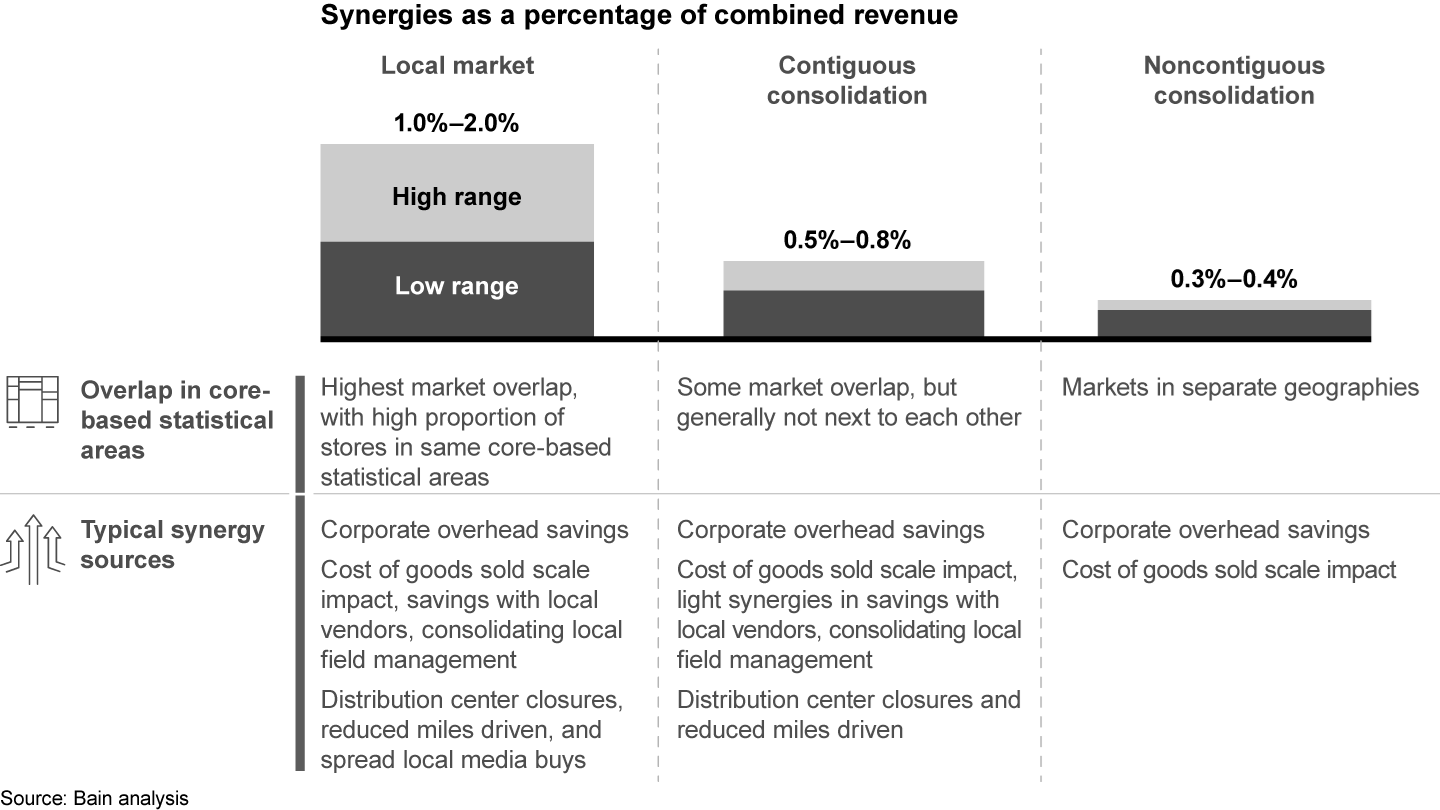
Gaining scale continued to be a strong deal rationale in 2020. For example, 7-Eleven acquired 3,900 Speedway convenience chain stores in the US, further strengthening its existing 9,800 store network in North America. The combined company’s footprint includes 47 of the 50 most populated metro areas in the US, making it significantly larger than Alimentation Couche-Tard, the No. 2 convenience store operator in North America.
As retailers reevaluate their portfolios, they will also choose to exit some markets and turn their attention to building scale presence in other markets. That is what UK-based Tesco did by selling its Thailand and Malaysian operations to the Charoen Pokphand foods group. The deal was one of many divestitures that mark a refocusing on Tesco’s core UK business.
The new battlefield is acquiring digital and data capabilities
As retailers scale up to generate synergies to boost margins and invest in growth, companies will differentiate themselves strategically from competitors by successfully integrating scope acquisitions. Scope will increase in importance for innovation, digital capability acceleration, and ecosystem building as companies pursue new sources of growth and ways to deliver a stronger value proposition to customers.
Traditional retailers have turned to scope M&A to make advances in fast-growing e-commerce segments.
Online retail was already gaining momentum before the Covid-19 crisis, making omnichannel retail the decisive business model of the future. Traditional retailers have responded by turning to scope M&A to make advances in fast-growing e-commerce segments. Back in 2018, Walmart acquired Flipkart, India’s leading e-commerce company, to get access to that vast market. Richemont acquired YOOX Net-a-Porter Group to gain a foothold in online luxury. In 2020, Caesars Entertainment entered online gaming through the acquisition of William Hill, a US-based online sports betting company.
Retailers also are using scope M&A to access capabilities that will improve their customer value proposition in different ways. For example, scope deals can help retailers speed the pace of innovation. Scope M&A enables them to leverage data and advanced analytics to resegment and more deeply understand the needs of their core consumers. Many companies are finding that it is faster and more effective to acquire or partner than to build these capabilities internally.
Meanwhile, retailers are entering deals that allow them to participate in open ecosystems that are becoming instrumental for making the most of their own assets, adding new capabilities and opening up new profit pools. Amazon, Tencent, and Alibaba set the pace by establishing ecosystems through internal capabilities as well as multiple scope deals and partnerships to deliver an engaging customer experience. Building such an ecosystem was one of the benefits of Target’s acquisition of same-day delivery platform Shipt, for example. Finally, retailers use scope deals for the data, advertising, technology, and distribution that can help them boost margins and growth through business-to-business adjacencies.
Four types of grocery retailers, four approaches to M&A
In grocery, one of the biggest retailing sectors, companies will use M&A to achieve different strategic aims. We see companies falling into four distinct categories: the consolidators; local/regional gems; the value contenders; and the rest (see Figure 2 and the Bain Brief “The Future of Retail: Winning Models for a New Era”).
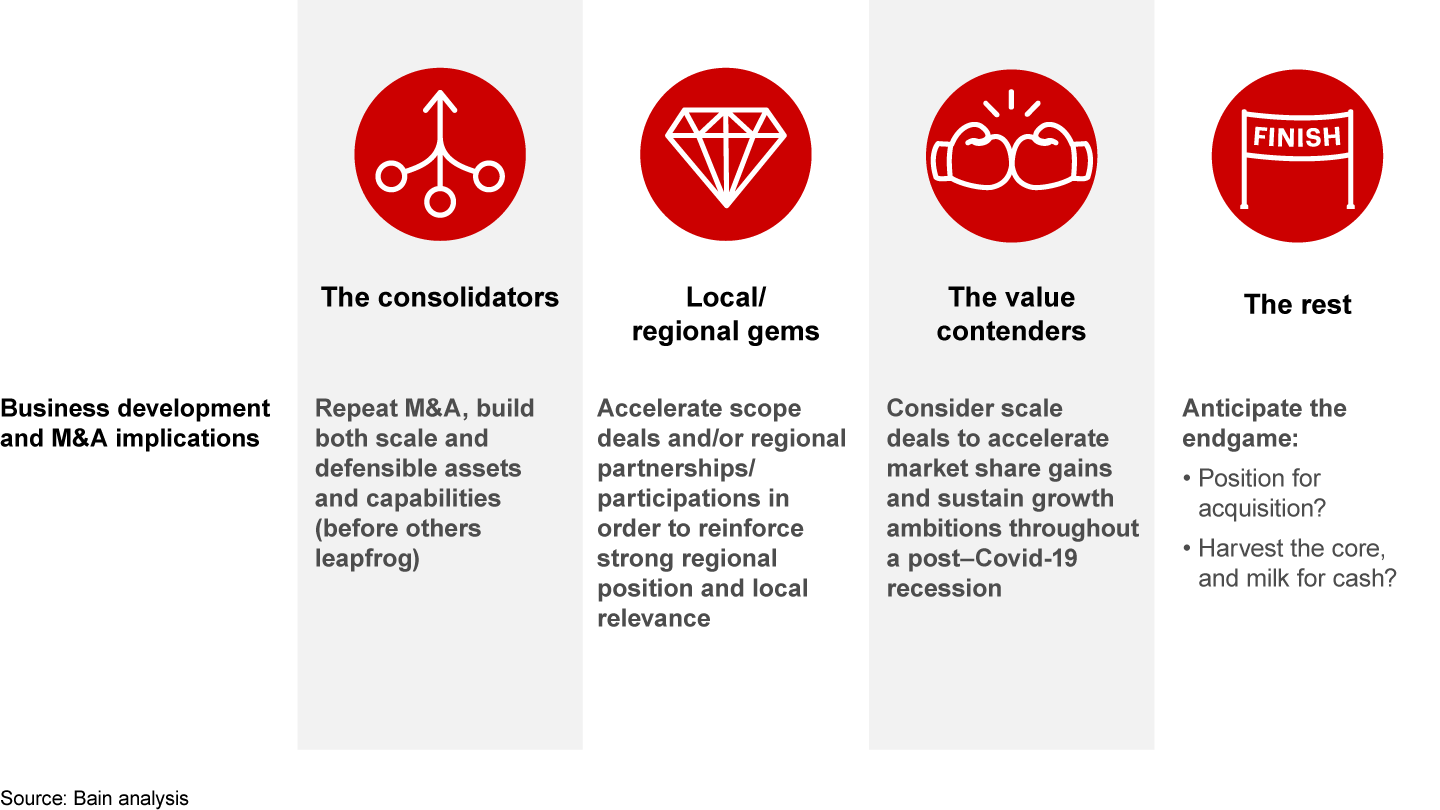
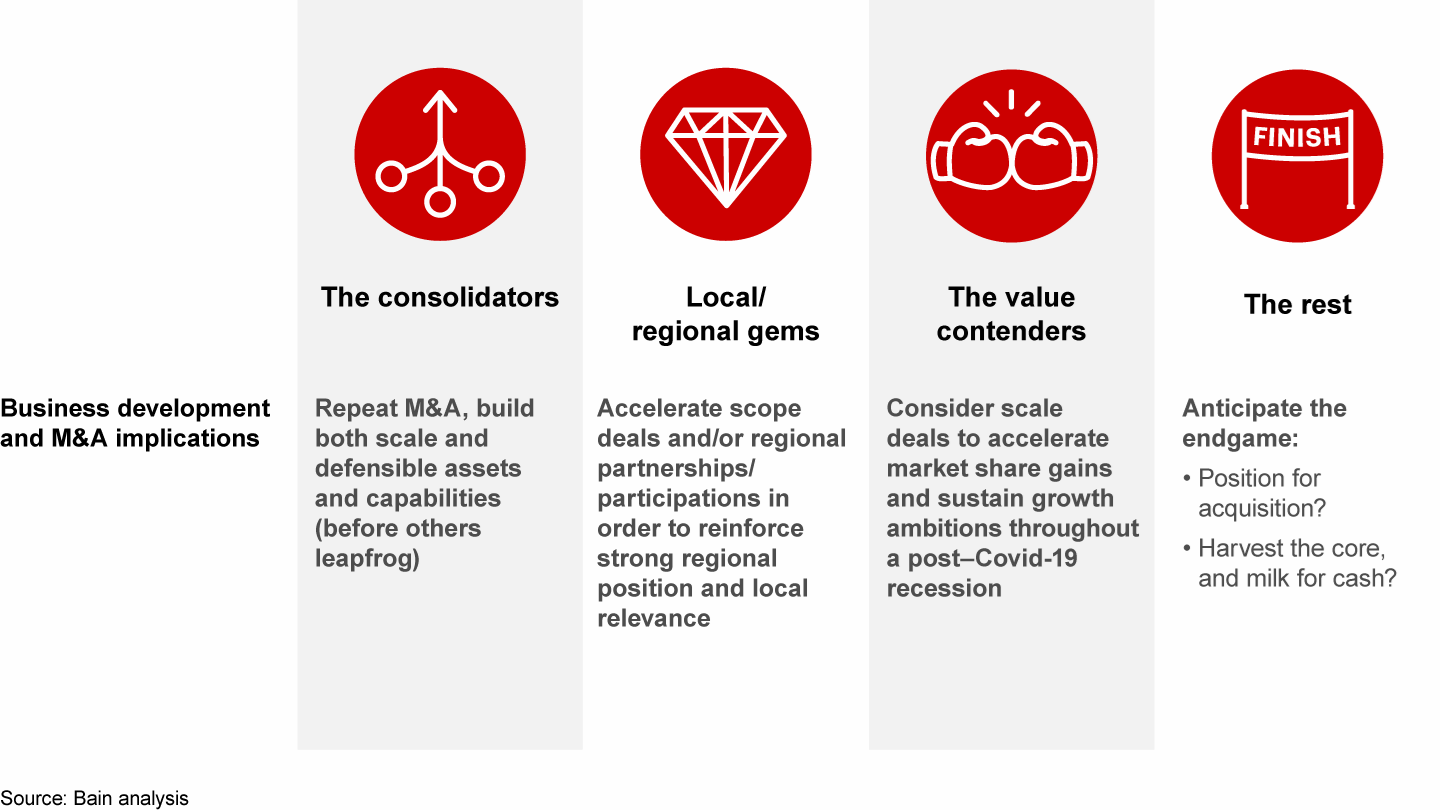
The consolidators will use M&A to both build scale and invest in capabilities for everything from e-commerce to delivery to private labels. The year 2020 saw several deals in delivery alone, such as Ahold Delhaize’s acquisition of FreshDirect and Costco’s deal for Innovel Solutions.
Local/regional gems will continue to improve their local relevance by building loyal customer bases and differentiated value propositions. Gems such as H-E-B in the US or Migros and Sonae MC in Europe could accelerate their scope deals or regional partnerships and participations to reinforce their strong regional position and local relevance.
The value contenders will continue to simplify operations to help sustain strong growth plans. In many geographies, traditional scale deals, such as Aldi’s purchase of Leader Price stores in France, will present important opportunities to accelerate market share gains and pursue growth ambitions through a possible post–Covid-19 recession.
The rest will evolve incrementally—and, by avoiding M&A, risk being left behind.
The new M&A imperative for retail
Retailers have a full list of deal options from which to choose. They can participate in the types of scale or scope deals we’ve described, or they can set up corporate venture capital units to invest in promising businesses. They can partner via accelerators, joint ventures, or other collaborative arrangements. They can build tech labs, incubators, or other entities for grassroots innovation. There is no single approach that works best. For example, some retailers prefer to go the purchasing alliance route while others find that scale deals can generate much bigger benefits. For all retailers, portfolio management and ecosystem building are essential to boosting the odds of long-term success.
Across all winning strategies in retail, the best players repeat M&A, build an M&A engine, and tailor their M&A capabilities to their M&A agendas.
Repeat M&A. Serial buyers are more successful. Not only do they deliver stronger shareholder returns, top-line growth, and profit growth but also with each successive deal, they increase the odds for the next M&A success (see Figure 3). Again, consider the experience of serial acquirers such as Walmart, Ahold Delhaize, and Costco—all of which were able to respond swiftly to Covid-19 by purchasing delivery companies.
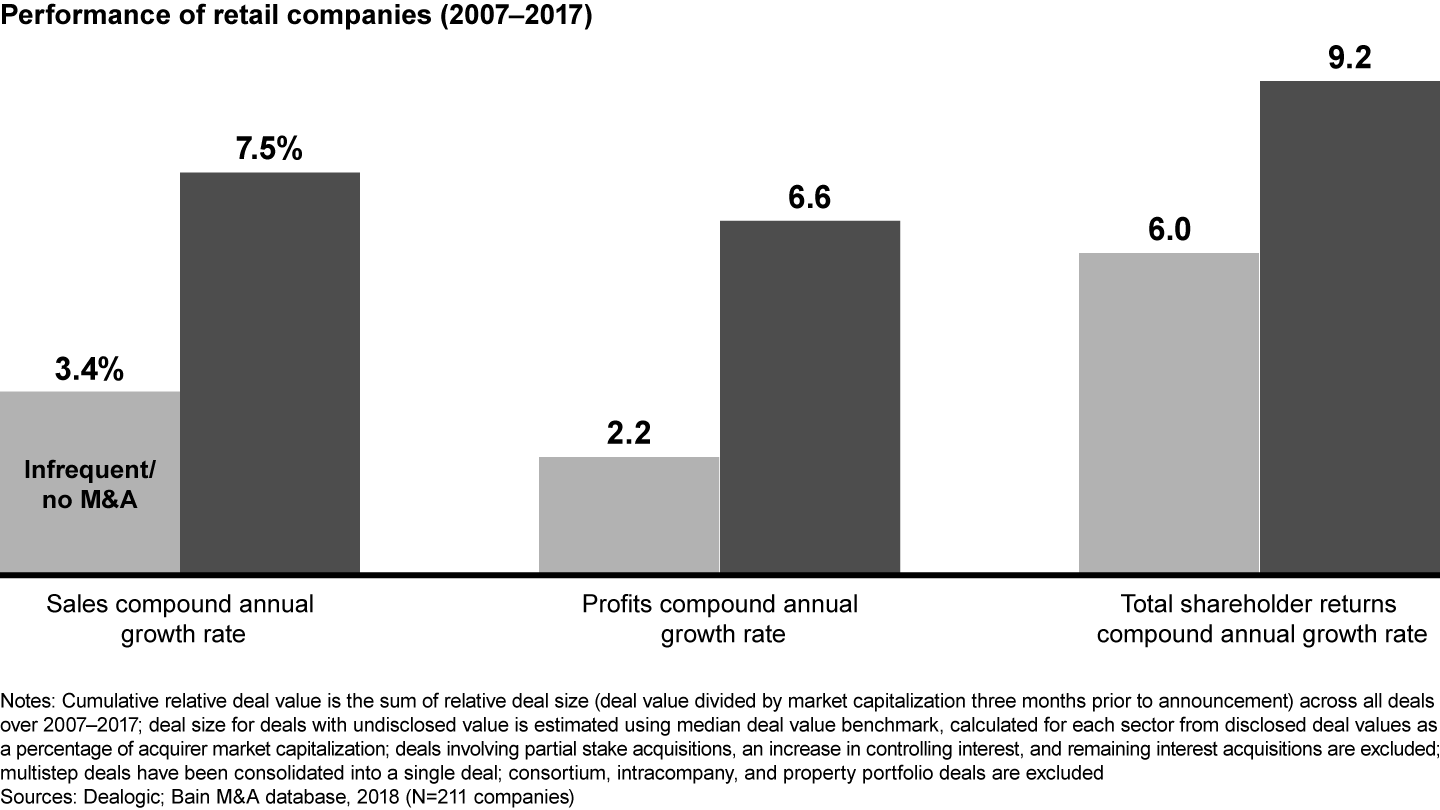
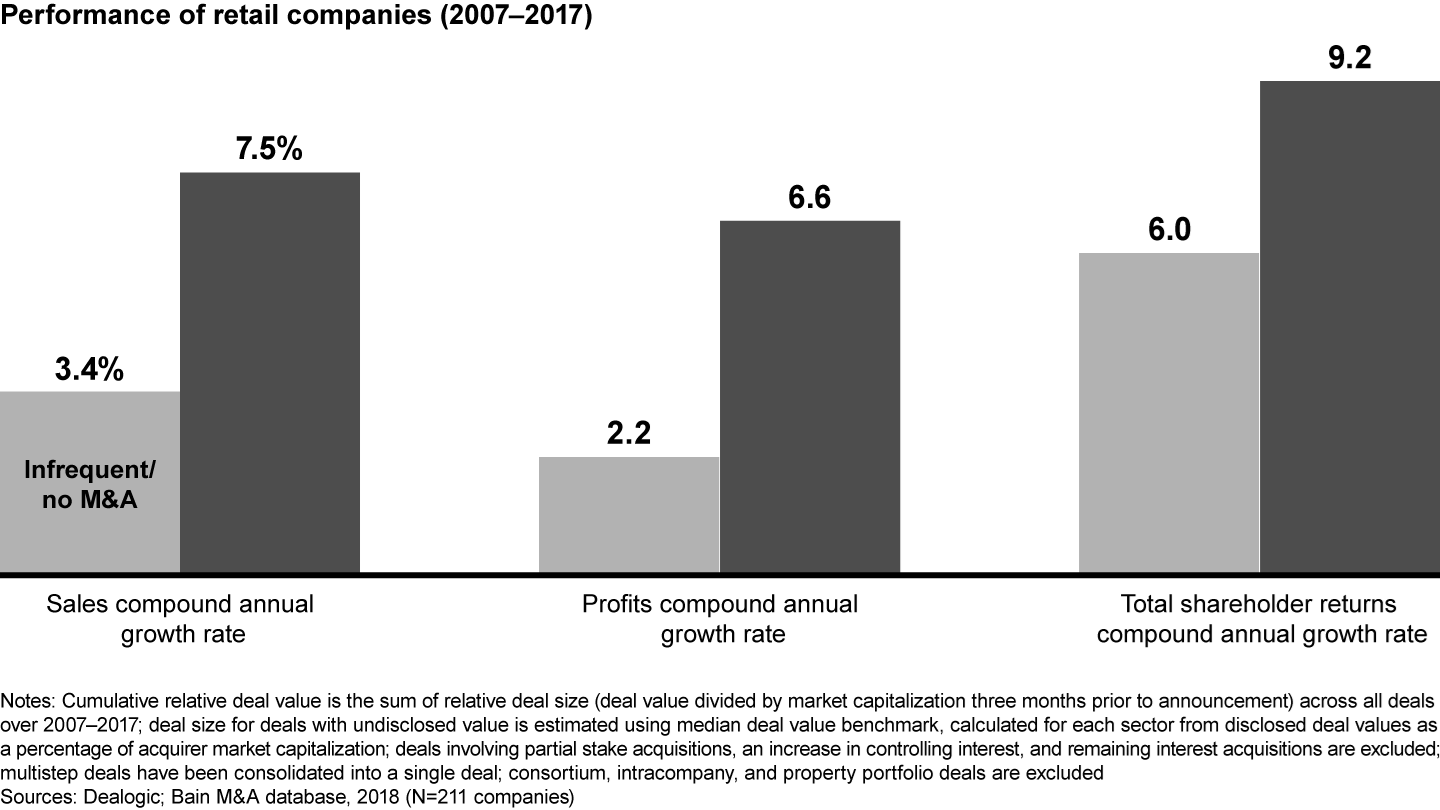
Build an M&A engine. The best acquirers sustain the M&A capability over time. They build a strong M&A culture and a community to support and continuously strengthen it, even in times of lower M&A activity.
Tailor M&A capabilities to M&A agenda. Winning dealmakers find the right approach for each type of deal, choosing the right mix of scope vs. scale, national vs. more challenging cross-border deals, and buying vs. partnering. The most successful acquirers never assume that their old playbooks will always work. As a start, any retailer needs to ask a series of questions:
- What do we need to own at any cost?
- What capabilities should we be cultivating?
- Which traditional capabilities (supply chain) and new capabilities (digital) will move the needle for us?